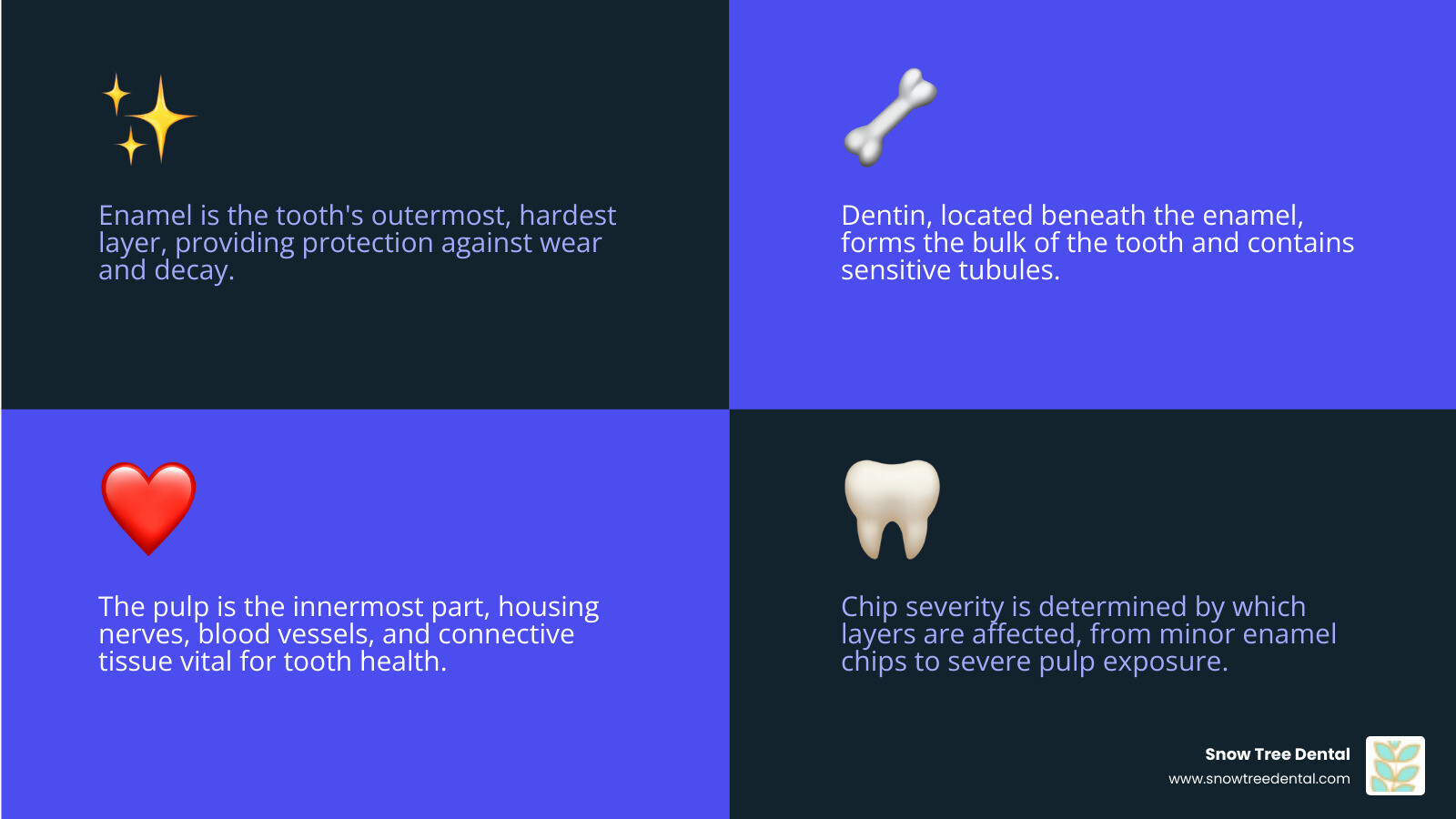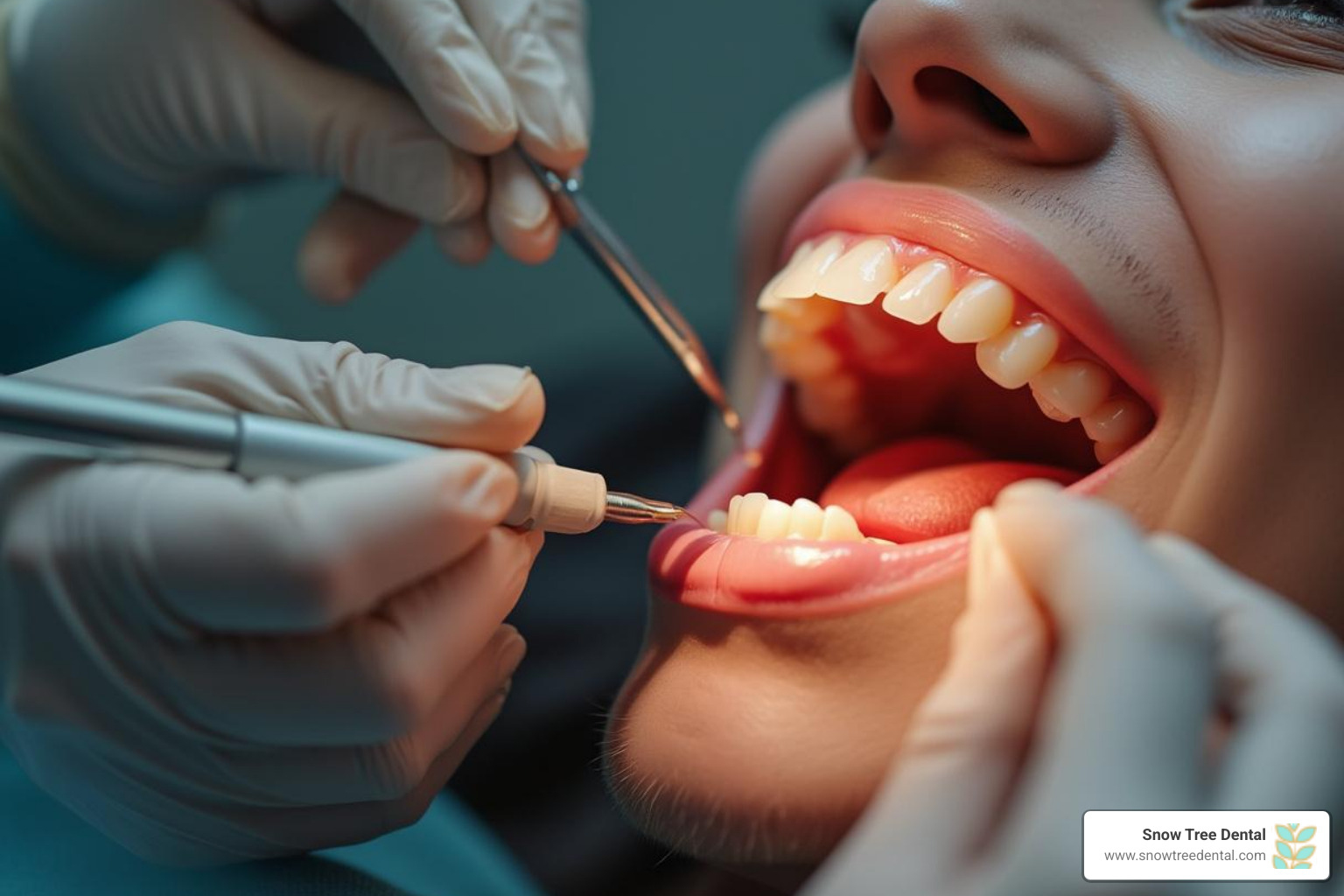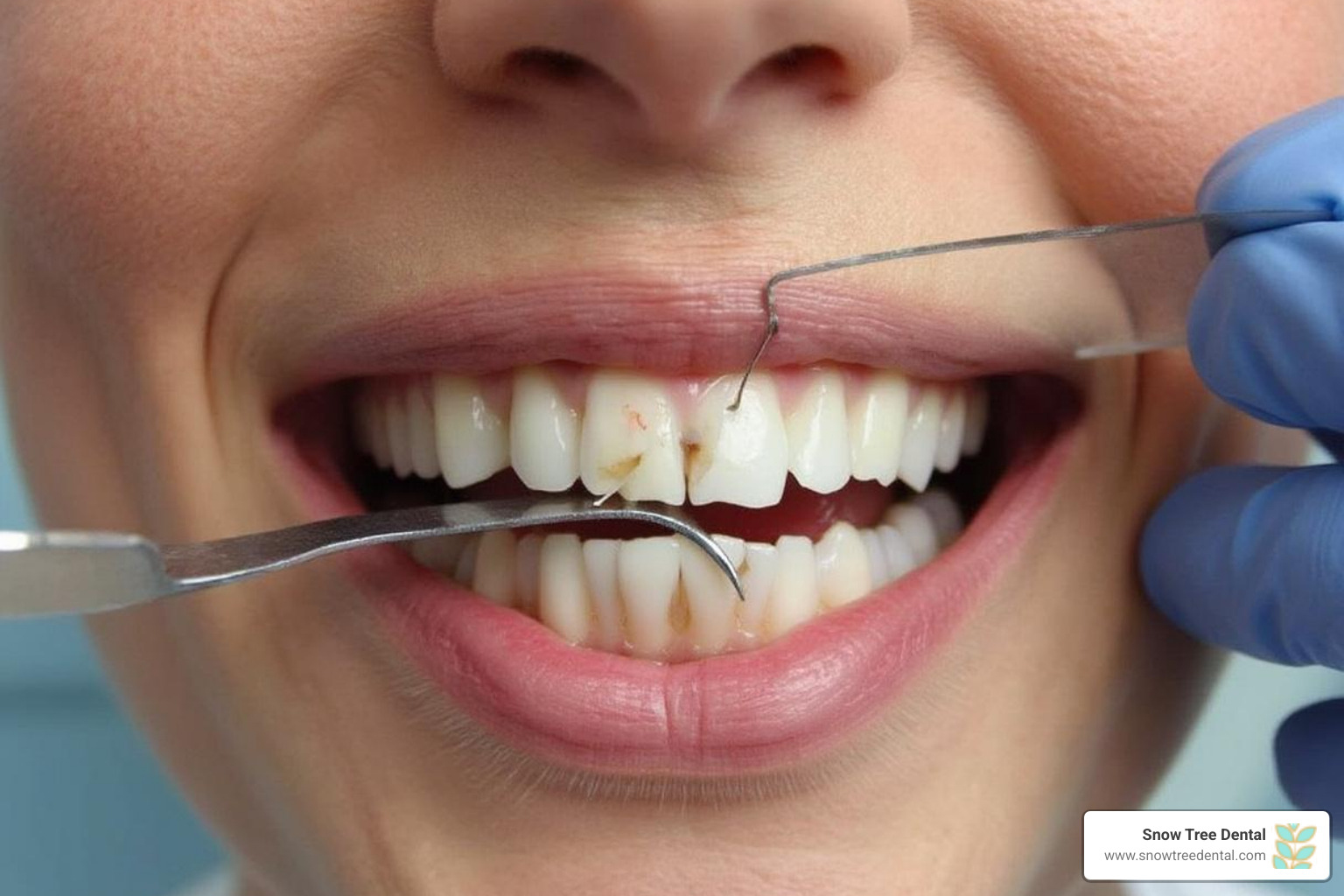Chipped Tooth Repair: 1 Ultimate Confidence
Why Professional Chipped Tooth Repair Matters for Your Smile
Chipped tooth repair options range from simple polishing for minor chips to complex root canal therapy for severe damage. The right treatment depends on how deep the chip extends into your tooth’s layers.
Quick Overview of Repair Options:
| Chip Severity | Treatment | Time Required | Cost Range |
|---|---|---|---|
| Minor (enamel only) | Polishing or bonding | 30-60 minutes | $200-$600 |
| Moderate (into dentin) | Veneers or crowns | 2-3 visits | $600-$1,637 |
| Severe (pulp exposed) | Root canal + crown | Multiple visits | $970-$3,137 |
Crunching on ice or hard candy and suddenly feeling a broken piece of your tooth is a common, unsettling experience. The good news is that modern dentistry offers excellent solutions for every type of chip.
The key is acting quickly. Even small chips can lead to bigger problems if left untreated. Sharp edges can cut your tongue, bacteria can enter exposed areas, and a minor cosmetic issue can become a painful emergency.
According to the American Dental Association, repair costs can range from $200 for simple bonding to over $2,000 for complex cases. The severity of your chip, its location, and how quickly you seek treatment all affect your options and costs.
As Dr. Muna Mohammad at Snow Tree Dental, I’ve helped countless Houston families restore their smiles after chipped tooth injuries. Understanding your options is key to feeling confident about treatment and achieving the best long-term results.
First Aid: What to Do Immediately After Chipping a Tooth
When you chip a tooth, what you do in the first few moments is crucial for your comfort and future treatment. Here’s what to do immediately.
Start by rinsing with salt water. Mix a teaspoon of salt in warm water and gently swish to clean the area and help prevent infection. Plain warm water also works.
If there’s bleeding, control it quickly by applying gentle pressure with clean gauze or a soft cloth.
Apply a cold compress to the outside of your cheek near the chipped tooth. This reduces swelling and provides natural pain relief.
Protect sharp edges to avoid cutting your tongue or cheek. Dental wax from a pharmacy is ideal. In a pinch, a piece of sugar-free gum can serve as a temporary cover.
Save the tooth fragment if you can find it. Place the piece in a container with milk or your own saliva. We can sometimes reattach it.
Change your eating habits right away. Eat soft foods like yogurt, soup, or scrambled eggs, and avoid chewing on the damaged side to prevent further injury.
For pain relief, over-the-counter medications like ibuprofen can reduce pain and inflammation. A tiny dab of clove oil on the area can also provide temporary numbing.
These first-aid steps are temporary. A chipped tooth, even if painless, needs professional attention to prevent bacteria from causing bigger problems. We understand dental emergencies don’t follow business hours, which is why we offer same-day appointments and flexible scheduling. You can find more info about our emergency services on our website or call us directly.
Professional Chipped Tooth Repair: From Minor Fixes to Major Restorations
The right treatment for a chipped tooth depends on how deep the damage goes. Your tooth has three layers: the hard outer enamel, the softer dentin underneath, and the inner pulp, which contains nerves and blood vessels.
- Enamel Chip: You may not feel pain, but you’ll notice a sharp edge.
- Dentin Chip: This layer connects to the nerve, so you’ll likely feel sensitivity to hot, cold, or sweet things.
- Pulp Exposure: A chip this deep is often painful and makes the tooth vulnerable to serious infection.
At Snow Tree Dental, our goal is to restore your tooth’s function and beauty with the least invasive method possible. More info about Cosmetic Dentistry options are available on our website.
Minor Chips: Polishing and Dental Bonding
Minor chips affecting only the enamel are common and usually easy to fix.
Cosmetic contouring is a simple polishing and reshaping of the edge to smooth it out, often without needing any numbing.
For slightly larger chips, dental bonding is an excellent solution. We apply a tooth-colored composite resin and sculpt it to restore your tooth’s original shape. A special UV light hardens the material, completing the repair in a single 30-60 minute visit. The result is incredibly natural-looking.
Dental bonding is a budget-friendly, single-visit procedure that typically lasts 4 to 8 years, depending on your habits. Avoid chewing ice or using your teeth as tools to ensure it lasts.
Moderate Chips: Veneers and Crowns
When a chip extends into the dentin or affects a larger area, we need stronger solutions like veneers and crowns.
| Treatment | Cost Range | Longevity | Procedure | Best Use Cases |
|---|---|---|---|---|
| Bonding | $200-$600 | 4-8 years | Single visit, resin applied & hardened | Minor chips, small gaps, quick fix |
| Veneers | Up to $1,200 | 10-20 years | 2+ visits, thin shell bonded to front | Moderate chips, discoloration, reshaping front teeth |
| Crowns | $278-$1,637 | 15+ years | 2+ visits, full cap covers tooth | Large chips, decay, after root canal, weakened teeth |
Dental veneers are thin, custom-made porcelain shells bonded to the front of your teeth, ideal for improving appearance. After removing a tiny amount of enamel, we take an impression for a dental lab to craft your veneer. In a second visit, we permanently bond it to your tooth. Veneers look natural, resist stains, and can last 10 to 20 years.
Dental crowns are a heavy-duty solution for large chips that weaken a tooth. A crown, or cap, covers the entire tooth to restoring both function and appearance. We offer crowns in various materials like porcelain, ceramic, or metal alloys. The process usually takes two visits and results in a restoration that can last 15 years or more, restoring full chewing power.
Severe Chips: When a Root Canal is the Necessary Chipped Tooth Repair
A chip that reaches the tooth’s nerve center (the pulp) causes severe pain and sensitivity, requiring root canal therapy.
An exposed pulp allows bacteria to enter, causing infection that can lead to a painful abscess. During root canal therapy, we remove the infected pulp, clean the inside of the tooth, and seal it to prevent future infection. Modern root canals are comfortable procedures performed under local anesthesia.
After a root canal, the tooth becomes more brittle and needs protection. We almost always recommend placing a crown over it. The total investment for this repair ranges from $970 to over $3,000, which is significantly less than replacing a lost tooth with an implant. We use the latest techniques to ensure you’re comfortable throughout the treatment.
For comprehensive information about our emergency and general dental services, visit our More info about General Dentistry page.
Understanding the Costs and Insurance Coverage
Cost is a major concern with a chipped tooth. Fortunately, chipped tooth repair costs vary widely, and there’s likely a solution that fits your budget.
Key factors influencing the price include the severity of your chip, the type of treatment you choose, and the materials used for the restoration. At Snow Tree Dental, we believe in transparent pricing so you’ll never face unexpected costs.
Here are average cost ranges for common treatments, based on data from the American Dental Association:
- Dental Bonding: $200 to $600
- Single Dental Crown: $278 to $1,637
- Single Dental Veneer: Up to $1,200
- Root Canal: $470 to $1,500 (plus the cost of a crown)
- Dental Implant: $540 to $2,868 (for cases where the tooth can’t be saved, excluding the crown)
Will Your Insurance Help Cover the Costs?
Whether insurance covers the cost depends on why the repair is needed. Insurance typically covers medically necessary treatments that restore function, prevent infection, or relieve pain, such as fillings, crowns, and root canals.
Cosmetic procedures, like a veneer for a tiny chip, may have limited or no coverage, depending on your plan. It’s best to call your insurance provider to understand your specific benefits. Also, your Flexible Spending Account (FSA) or Health Savings Account (HSA) can often be used for medically necessary dental work.
At Snow Tree Dental, we offer an in-house dental plan to make quality care more accessible. Our team is always happy to discuss your treatment and financial options to find a solution that works for you.
Prevention and The Dangers of DIY Repairs
While some chips are accidental, many can be prevented with a little awareness.
What Usually Causes Chipped Teeth?
- Biting hard foods: The most common cause is biting on things like ice, hard candy, or popcorn kernels.
- Sports injuries: A blow to the face during contact sports can easily damage teeth.
- Teeth grinding (bruxism): This habit, often occurring during sleep, weakens enamel over time.
- Using teeth as tools: Opening packages or tearing tape with your teeth puts them at risk.
- Poor oral hygiene: Teeth weakened by decay are more likely to chip.
For comprehensive strategies to protect your teeth, visit our More info about Preventative Dentistry page.
Simple Ways to Protect Your Teeth
- Wear mouthguards during sports. A custom-fitted guard offers the best protection.
- Avoid hard foods and ice. Break the habit of chewing on hard items.
- Don’t use your teeth as tools. Keep scissors and bottle openers handy.
- Use a nightguard if you grind your teeth to protect your enamel from pressure.
- Maintain good oral hygiene with regular brushing, flossing, and professional cleanings.
Why DIY Repairs Are Dangerous Territory
While tempting, attempting chipped tooth repair yourself is dangerous for your oral health. Here’s why professional care is essential:
- Super glue is toxic: It contains harmful chemicals and traps bacteria, which can lead to serious infection.
- Filing your own teeth is damaging: You can permanently remove enamel, causing sensitivity, decay, and bite problems.
- Temporary kits have limitations: They are not a strong, long-term solution and can trap food and bacteria, worsening the problem.
The cost of waiting or attempting a DIY fix often exceeds the cost of prompt, professional treatment. A minor chip can quickly become a major problem requiring a root canal or extraction.
Professional chipped tooth repair uses safe, biocompatible materials to restore your tooth’s function and appearance while protecting your overall health. At Snow Tree Dental, we offer flexible scheduling and same-day appointments to address dental emergencies promptly.
Frequently Asked Questions about Chipped Tooth Repair
It’s natural to have questions about a chipped tooth. Here are answers to some of the most common concerns we hear from our Houston patients.
Will a small, painless chip heal on its own?
No, teeth cannot heal themselves. Unlike skin or bone, tooth enamel lacks living cells to regenerate. Even a painless chip compromises your tooth’s protective barrier, creating sharp edges that can irritate your mouth and leaving the tooth vulnerable to bacteria and further damage.
Like a small crack in a windshield, a minor chip can spread and lead to bigger, more expensive problems. A quick dental check-up is the best way to prevent this.
How long do different chipped tooth repair treatments last?
The longevity of your chipped tooth repair depends on the treatment type and your personal habits.
- Dental bonding is a durable solution that typically lasts 4 to 8 years.
- Dental veneers are highly resilient and can last 10 to 20 years with proper care.
- Dental crowns are the most long-lasting restoration, often serving for 15 years or more.
Your habits are key. Good oral hygiene, regular dental check-ups, and avoiding using your teeth as tools will extend the life of any restoration.
Is the chipped tooth repair process painful?
Pain is a common concern, but we prioritize your comfort during every procedure.
- For minor chips, treatments like polishing and dental bonding are painless and rarely require anesthesia.
- For veneers or crowns, we use local anesthesia to completely numb the area. You may feel pressure or vibration, but no pain. Mild sensitivity afterward is normal and manageable with over-the-counter relievers.
- Root canals eliminate pain, they don’t cause it. The procedure is done under local anesthesia to relieve the severe pain of an infected tooth. Most patients are surprised by how comfortable the process is.
At Snow Tree Dental, we use modern techniques and technology to make every procedure as comfortable as possible, getting you out of pain and back to your life.
Restore Your Smile with Confidence
A chipped tooth can be overwhelming, raising concerns about cost, treatment, and appearance. The good news is that modern chipped tooth repair offers a solution for every situation, from quick bonding to full restorations, with options to fit your budget and schedule.
Don’t wait and hope it gets better. Teeth can’t heal themselves, and delaying treatment can turn a small cosmetic issue into a painful and expensive problem.
At Snow Tree Dental, we’ve helped countless Houston families with dental emergencies. We offer flexible scheduling for emergencies, including evening and Saturday appointments, so you can get care when you need it.
Our approach combines modern technology for comfortable care with transparent pricing and an in-house dental plan to make treatment accessible. Many patients are surprised at how quick and painless their chipped tooth repair is.
Your smile is vital to your confidence. Don’t let a chipped tooth hold you back.
Contact Us to schedule your consultation today. We’re here to help you get your smile back on track.








